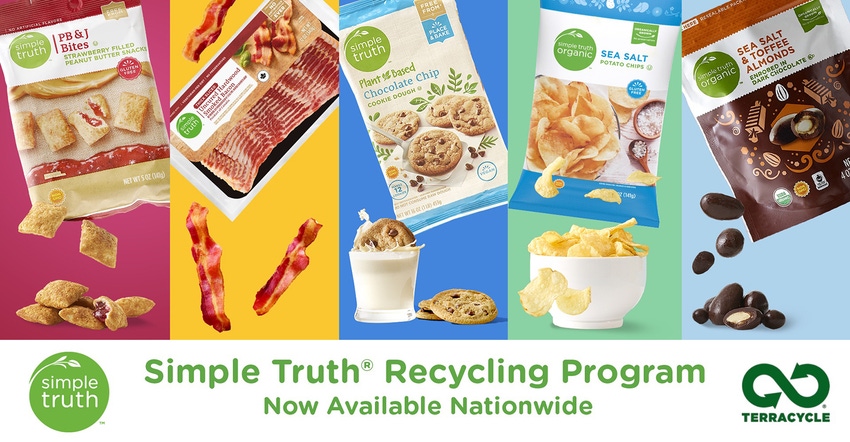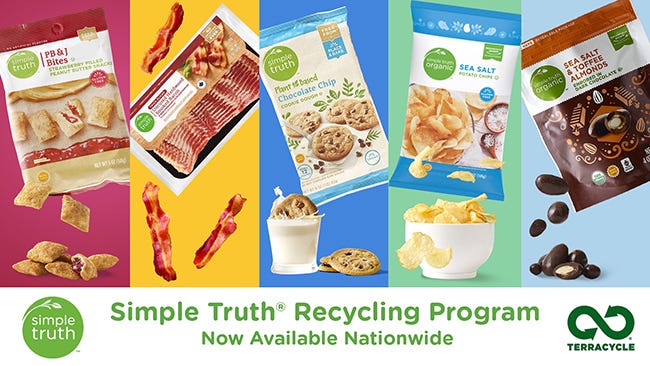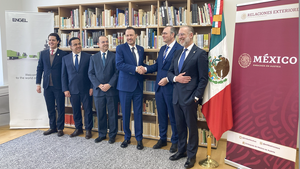Kroger Reaps As You Sow’s Disapproval, as It ‘Lags’ Commitments Made by Competitors
Kroger’s new sustainability goals, announced this week, “fall far short of what the company needs to be doing,” according to the environmental organization.
August 26, 2020

Cincinnati-based Kroger Co. announced this week its new sustainable packaging goals that, according to anti-plastic activist group As You Sow, “fail to acknowledge the urgency of the plastic pollution crisis, and lag competitor commitments.” This statement came after As You Sow filed shareholder resolutions with Kroger, urging the company to make its private-label packaging reusable, recyclable, or compostable. The proposals were strongly supported by shareholders, earning nearly 40% support in 2019 and 2020, according to the activist group, which typically puts forth proposals requiring a vote at shareholder corporate meetings.
Regardless of the outcome, it’s never enough for As You Sow. “As the largest grocery retailer in the country, Kroger has a responsibility to be a leader in this space and set a high bar for sustainable packaging,” said Conrad McKerron, Senior Vice President of As You Sow. Kroger’s commitments “fall far short of what the company needs to be doing,” he added.
Kroger responded to shareholder requests by pledging to make its Our Brands packaging 100% reusable, recyclable, or compostable by 2030, a timeline that “lags far behind direct competitors like Walmart” and more than 100 companies that have pledged to make their packaging fully reusable, recyclable, or compostable by 2025, five years sooner than Kroger’s commitment, said As You Sow.
Of course, just because a company “commits” to altering its packaging within a certain timeframe doesn’t mean it will actually happen. Many CPG companies commit to making their packaging 100% reusable, recyclable or compostable by a certain date in the near future in an effort to pacify As You Sow and get that activist organization off their backs. However, As You Sow is nothing if not diligent: If the CPG company fails to fulfill its commitment by the compliance date, As You Sow will call it out and “green-shame” it.
While other global signatories committed to an average of 25% recycled content in plastic packaging, As You Sow groused that “Kroger set no recycled content goal for plastics, only a mixed recycling content goal of 10%, a number that can be inflated by materials like paper that have higher recycled content rates. Further, the company actually weakened a previous pledge, slashing its goal of 20% recycled content material in half. The company’s other stated goals, such as general waste reduction, lack accountability metrics.”
Kroger launches Simple Truth Recycling via TerraCycle's Loop program
As You Sow at least gives Kroger credit for its announcement on Aug. 4, 2020, of a plan to launch Simple Truth Recycling through TerraCycle’s Loop program. Simple Truth Recycling is free to customers and offers them a “simple way to recycle the flexible packaging of more than 300 products from Simple Truth, America’s largest natural and organic brand, with annual sales exceeding $2.5 billion in 2019,” according to a press release from Kroger.
The new platform, as Kroger explains it, will allow customers to recycle a “wide range of flexible packaging not currently accepted in curbside recycling programs, such as produce bags, bread bags, and plastic overwrap from household items like tissues and bottled water. Customers can put these flexible wraps into a box and ship them to TerraCycle using a free, prepaid shipping label.
|
Kroger's Simple Truth Recycling allows consumers to ship flexible packaging not currently accepted in curbside recycling programs to TerraCycle using a free, prepaid shipping label. Image courtesy Kroger. |
This is not Kroger’s first affiliation with TerraCycle’s Loop program. In May 2019, Kroger announced a retail partnership with the newly established Loop “reusable packaging system, enabling customers in select markets to purchase more than 100 products from leading consumer brands that have been redesigned with durable containers,” said Kroger’s announcement last year.
“Our commitment to innovative solutions on our path to Zero Hunger | Zero Waste aligns perfectly with Loop’s mission to create a convenient circular packaging platform for consumers,” said Jessica Adelman, Kroger’s Group Vice President of Corporate Affairs, in a May 21, 2019, release. Products available on the Loop platform are packaged in reusable glass or metal containers and shipped directly to consumers in a specially designed tote. Once used, products are retrieved through free-at-home pickup, then cleaned, refilled, and reused, creating what TerraCycle calls a “first-of-its-kind circular packaging system.”
This sounds to me like a recycling program for low-density polyethylene (LDPE), which is already collected in-store at Kroger and Kroger-owned grocery stores like Fry’s and others. Why not just put the LDPE and linear-low-density PE flexible packaging into the in-store bins for local processors to recycle?
I also wonder how the original Loop/Kroger partnership is working out with customers sending back reusable glass and metal containers to Loop for cleaning and shipping to brand owners for refilling. There is nothing on either the TerraCycle or Kroger websites that talks about how successful that program has been over the past year.
Kroger’s recent press release noted that the company reduced the amount of plastic resin in its Our Brands packaging by 10.1 million pounds, achieving its goal to reduce usage by 10 million pounds ahead of schedule. Evidently, As You Sow wasn’t impressed with Kroger’s progress. Kroger released its latest sustainable packaging results in its “2020 Environmental, Social and Governance (ESG)” report this month.
The 2020 ESG report noted that under Kroger’s Zero Waste initiative, the company plans to cumulatively recycle more than 200 million pounds more plastic by the end of 2020 from a 2017 baseline (53.7 million pounds were recycled in 2019). The company also committed to continue to integrate reusable plastic containers into its network, test new technologies that reduce waste in the supply chain, and phase out single-use plastic shopping bags.
The value of plastic packaging
Kroger’s packaging commitments in the 2020 ESG report call for the company to seek to optimize Our Brands manufactured product packaging in several ways:
Reduce plastic resin by 10 million pounds, from a 2015 baseline;
use at least 20% post-consumer recycled (PCR) content;
increase recyclability of plastic packaging;
increase communication about recyclability on all applicable packaging;
support the expansion of infrastructure to increase the availability and accessibility of recycling for the Our Brands product packaging.
Most CPGs know the value of plastic in the packaging of their products, and understand through many studies that plastic is environmentally optimal because fewer resources such as energy and water are used in its manufacture. Plastic packaging also keeps food fresh and shelf-stable and prevents food waste, one of Kroger’s goals.
As You Sow doesn’t believe the tremendous progress these companies are actually making in response to reducing material usage in packaging through better design, recyclability, and the use of PCR content. The activist group obviously doesn’t understand that any changes to packaging require time to incorporate new designs, such as thin-wall containers, and new materials, such as 20% PCR. That may require building new molds, a process that is costly and time consuming.
Perhaps if As You Sow knew more about manufacturing and the science of plastics, it would be less aggressive against these CPGs’ choice of packaging. It would also understand that the biggest players in the recycling end of things are consumers, who must take the initiative to put recyclable packaging into the waste stream headed for recycling. As You Sow needs to understand that much of the waste plastic and other materials in the environment get there because people do not put recyclable material in the proper recycling containers.
At the end of the day, it’s a people problem, not a plastics problem.
About the Author(s)
You May Also Like





